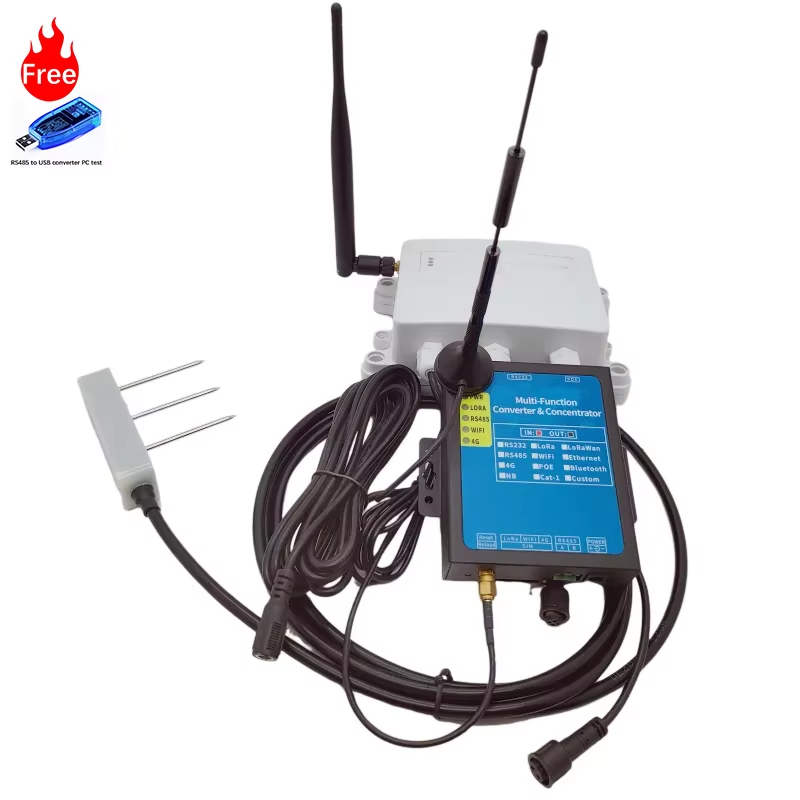Për të adresuar probleme të tilla si efikasiteti i ulët i prodhimit bujqësor dhe shpërdorimi i burimeve, qeveria nepaleze njoftoi së fundmi nisjen e një projekti me sensorë të tokës, duke planifikuar të instalojë mijëra sensorë të tokës në të gjithë vendin. Kjo teknologji inovative synon të monitorojë parametrat kryesorë si lagështia e tokës, temperatura dhe lëndët ushqyese në kohë reale për të ndihmuar fermerët të menaxhojnë prodhimin bujqësor në mënyrë më shkencore.
Përmirësimi i efikasitetit të menaxhimit bujqësor
Zyrtarë nga Ministria e Bujqësisë dhe Kooperativave të Nepalit thanë se lançimi i projektit do t'i ndihmojë fermerët të marrin informacion të saktë mbi tokën dhe të optimizojnë vendimet për ujitje dhe plehërim. Duke përdorur këta sensorë, fermerët mund të kuptojnë kushtet e tokës në kohë reale, në mënyrë që të përdorin ujin dhe plehrat në mënyrë më efektive dhe të zvogëlojnë humbjet e panevojshme të burimeve.
Zbatimi i projektit do t'u kushtojë vëmendje të veçantë fermerëve të vegjël, pasi ata përballen me shumë sfida në prodhimin bujqësor, duke përfshirë aksesin në treg, burimet e kufizuara dhe ndryshimet klimatike. Përdorimi i sensorëve të tokës do ta përmirësojë shumë produktivitetin e tyre dhe do t'i ndihmojë ata të arrijnë përfitime më të larta ekonomike.
Promovimi i zhvillimit të qëndrueshëm bujqësor
Nepali është një vend i dominuar nga bujqësia dhe jetesa e fermerëve është e lidhur ngushtë me kushtet klimatike dhe cilësinë e tokës. Projekti i sensorëve të tokës jo vetëm që mund të përmirësojë rendimentin dhe cilësinë e të korrave, por gjithashtu të ndihmojë në zhvillimin e praktikave bujqësore më të qëndrueshme dhe në promovimin e mbrojtjes ekologjike.
Ekspertët e bujqësisë theksojnë se menaxhimi i arsyeshëm i tokës mund të përmirësojë në mënyrë efektive shëndetin e saj, të zvogëlojë përdorimin e plehrave dhe pesticideve dhe kështu të zvogëlojë ndikimin në mjedis. Të dhënat e ofruara nga sensorët e tokës do t'u ofrojnë fermerëve një bazë shkencore për të udhëhequr zhvillimin e bujqësisë organike dhe të qëndrueshme.
Trajnim dhe mbështetje teknike
Për të siguruar zbatimin efektiv të kësaj teknologjie, qeveria dhe departamentet bujqësore të Nepalit do t'u ofrojnë fermerëve trajnime përkatëse për t'i ndihmuar ata të zotërojnë përdorimin e sensorëve të tokës dhe si të kuptojnë dhe zbatojnë të dhënat e mbledhura nga sensorët. Përveç kësaj, institucionet bujqësore planifikojnë gjithashtu të bashkëpunojnë me universitetet dhe institucionet kërkimore lokale për të kryer kërkime përkatëse për të përmirësuar më tej nivelin e teknologjisë bujqësore.
Bashkëpunimi qeveritar dhe ndërkombëtar për ndihmën
Financimi për këtë projekt vjen kryesisht nga bashkëpunimi midis qeverisë dhe organizatave ndërkombëtare. Aktualisht, qeveria nepaleze po punon ngushtë me Programin e Zhvillimit të Kombeve të Bashkuara (UNDP) dhe organizata të tjera joqeveritare për të ndihmuar fermerët të sigurojnë teknologjinë dhe burimet e nevojshme. Zbatimi me sukses i projektit do t'i sjellë Nepalit një nivel më të lartë të sigurisë ushqimore dhe një rezistencë më të fortë ndaj ndryshimeve klimatike.
Përfundim
Projekti për instalimin e sensorëve të tokës në Nepal shënon një hap të rëndësishëm përpara në bujqësinë moderne të vendit. Duke monitoruar kushtet e tokës në kohë reale, fermerët do të jenë në gjendje të menaxhojnë burimet në mënyrë më efektive, të përmirësojnë efikasitetin e prodhimit dhe aftësitë e zhvillimit të qëndrueshëm. Kjo masë jo vetëm që hedh themelet për modernizimin e bujqësisë së Nepalit, por gjithashtu ofron mbështetje të fortë për përmirësimin e standardeve të jetesës së fermerëve dhe promovimin e zhvillimit ekonomik rural.
Për më shumë informacion mbi sensorin e tokës,
ju lutemi të kontaktoni Honde Technology Co., LTD.
Email: info@hondetech.com
Uebfaqja e kompanisë:www.hondetechco.com
Koha e postimit: 18 janar 2025


